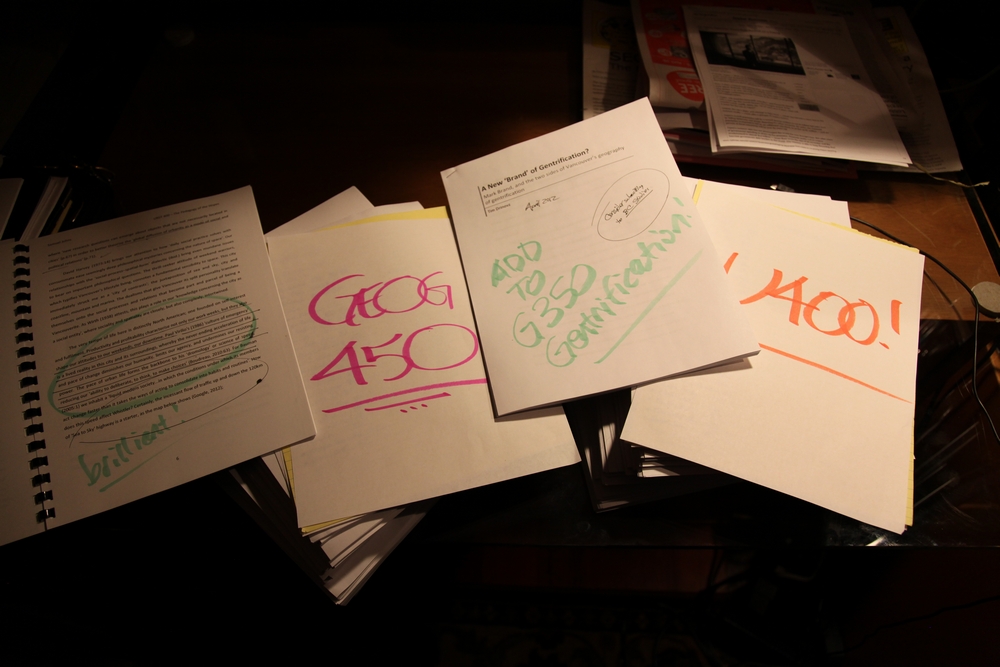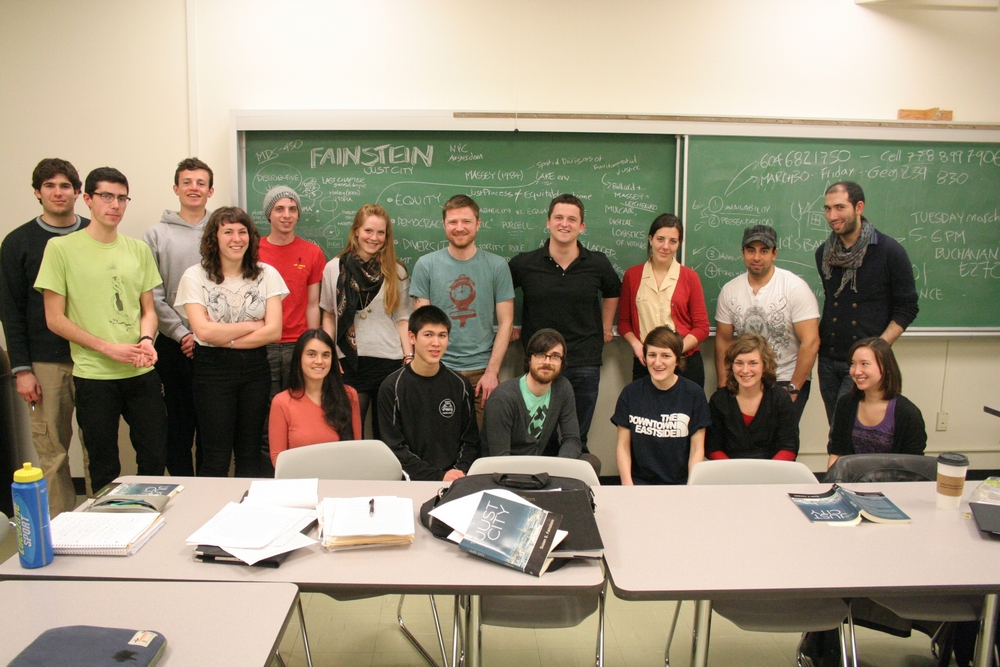

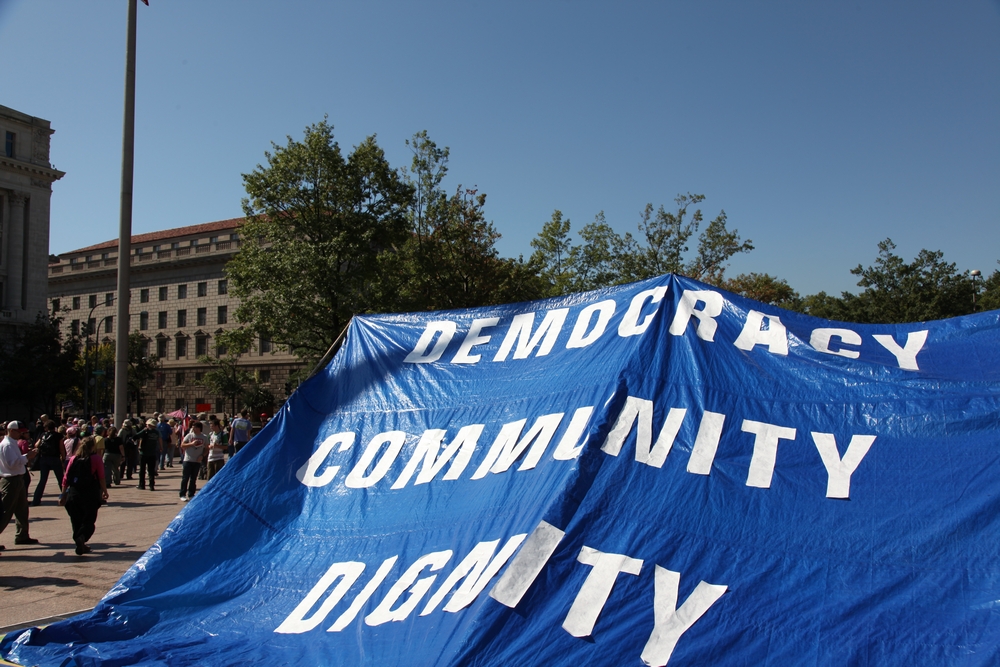
Urban Studies 400:
Seminar in Urban Studies
Before the First Class...
Before your first day in any seminar, and especially any seminar with me, I recommend you take a look at this:
Thanks to Jayme Walenta and F. Bonnie Kaserman for recommending this piece, which is also used in a course at the University of Kentucky. We certainly won't use Kahn's recommendations as absolute, rigid straightjackets, but many of the suggestions and insights are very much worth consideration.
The Right to the City
Schedule, January-May, 2012
Occupy DC, October 2011 (Elvin Wyly)
If you're looking for archival materials on "The City as an Entertainment Machine," see this.
Books on Reserve at the Geographic Information Centre
Core Texts for the Seminar:
Jonathan S. Davies and David L. Imbroscio, editors (2011). Critical Urban Studies: New Directions. Albany, NY: State University of New York Press.
Daniel Dorling (2011). Injustice: Why Inequality Persists. Bristol, UK: Policy Press.
David Harvey (2009). Social Justice and the City, Revised Edition. Athens and London: University of Georgia Press.
David Harvey (2011). The Enigma of Capital and The Crises of Capitalism. Oxford: Oxford University Press.
Susan S. Fainstein (2011). The Just City. Ithaca, NY: Cornell University Press.
Neil Brenner, Peter Marcuse, and Margit Mayer (2011). Cities for People, Not for Profit. New York and London: Routledge.
Other books that might be of interest. Please note that on the reserve shelf at the GIC, some of these may be listed under other courses I teach. If you don't find the book under the U400 tab, look under G250/U200, G350, or G450.
David Harvey (2000). Spaces of Hope. Berkeley: University of California Press.
Bunge, William (1971/2011). Fitzgeral: Geography of a Revolution. Athens, GA: University of Georgia Press.
Other recommendations.
Here are additional recommendations on the themes explored in this course. These are not required readings, and I haven't placed these on reserve. But you're fully capable of tracking these down if you think they might be useful for your goals for the course.
Don Mitchell (2003). The Right to the City. New York: Guilford.
David Harvey (2005). A Brief History of Neoliberalism. Oxford: Oxford University Press.
Clarissa Rile Hayward and Todd Swanstrom, eds. (2011). Justice and the American Metropolis. Minneapolis: University of Minnesota Press.
Andy Merrifield (2011). Magical Marxism: Subversive Politics and the Imagination. London: Pluto Press.
Leo Panitch, Greg Albo, and Vivek Chibber, eds. (2010). The Crisis This Time. London: Merlin Press.
Edward W. Soja (2010). Seeking Spatial Justice. Minneapolis: University of Minnesota Press.
Jean Swanson (2001). Poor-Bashing: The Politics of Exclusion. Toronto: Between the Lines.
Erik Olin Wright (2010). Envisioning Real Utopias. London: Verso.
Liberate yourself ... at the Library
For an entire lifetime, even two, we've been told by those in power that the spirit of the sixties was over. That spirit of demanding equality and civil rights? Over. Those days of insistent identity and organizing, of questioning the rigid rules of race, class, gender, and sexuality? Done.
And then, suddenly, in the depths of Great Depression 2.0 in the first decade of the twenty-first century, the cry for the right to the city could be suppressed no longer. It was a cry from the streets, as expected and predicted by philosophers and theorists from Henri Lefebvre to David Harvey to Don Mitchell and Marshall Berman. And the streets were the meeting-place for the revolutionary possibilities of theory and praxis: mobilizing and marching, yes, but also talking, listening, and reading in that most powerful of revolutionary forces ... the library. Consider this account of a violent police raid of the library at Occupy New York:
"During the raid, Stephen Boyer, a poet, friend, and [Occupy Wall Street] librarian, read poems from the Occupy Wall Street Poetry Anthology ... aloud directly into the faces of riot police. As they pushed us away from the park with shields, fists, billy clubs and tear gas, I stood next to Stephen and watched while he yelled poetry at the top of his lungs into the oncoming army of riot police. Then something incredible happened. Several of the police leaned in closer to hear the poetry. They lifted their helmet shields slightly to catch the words Stephen was shouting out to them, even while their fellow cops continued to stampede us. The next day, an officer who was guarding the entrance to Zuccotti Park told Stephen how touched he was by the poetry, how moved he was to see that we cared enough about words and books that we would risk violent treatment and arrest just to defend our love of books and the wisdom they contained."
William Scott (2011). "The People's Library Lives." The Nation, December 12, p. 5-6, quote from p. 6.
If you're interested in further exploration, see the Occupy Wall Street Poetry Anthology.
CopyLeft 2012 Elvin K. Wyly
Except where otherwise noted, this site is
Week One. January 9. Introduction. You. Me. The Course. Differences between seminar and lecture courses. "Learn" as an intransitive verb. Different kinds of seminars. Details of course logistics and expectations.
Read:
Week Two. January 16. Critical Urban Studies. What is critical urban studies?
Read:
Jonathan S. Davies and David L. Imbroscio (2010). "Foreword" (by Clarence Stone), "Preface," and "Introduction." Critical Urban Studies: New Directions. Albany: State University of New York Press, pp. vii-8.
Mara S. Sidney (2010). "Critical Perspectives on the City: Constructivist, Interpretive Analysis of Urban Politics." In Jonathan S. Davies and David L. Imbroscio, eds., Critical Urban Studies: New Directions. Albany: State University of New York Press, pp. 23-39.
Check this out... Don't you wish we could just drop everything we're doing right now and go to Christiana? Well, if your schedule is free after the end of term, perhaps you should get in touch with Anders Lund Hansen (a brilliant and fabulous urbanist!).
-----Original Message-----
From: On Behalf Of Anders Lund Hansen
Christiania Researcher in Residence (CRIR)
OPEN CALL 2012
The free town, Christiania, in Copenhagen celebrated its 40th years
anniversary in September 2011. We are happy to announce that CRIR will
continue in our current house till at least December 2012, with possibility
for prolongation. We are looking forward to hear your thoughts, projects and
research proposals. Christiania Researcher in Residence (CRIR) offers
residency for artists and academic researchers with a specific interest in
Christiania as an important field of study. Time of residency is typically
1-4 weeks depending on the project.
The aim of the Christiania Researcher in Residence project is to involve
artists, researchers and academics in an open, critical and reflective
dialog around the free town Christiania in Copenhagen, and to feed new
creative and critical thinking into the public realm. Christiania's insight
and experience into local organization, alternative architecture, lifestyle,
culture, sustainable environments, quality of life, democracy and innovation
is unique in the world and could generate important knowledge that may
inspire new urban thinking.
Christiania has reached an agreement with the Danish state after many years
of struggle and negotiations. A so-called ‘Christiania fund’ has to buy
part of the area from the Danish state. (See:
<http://www.christianiafolkeaktie.dk/> - look for the English version at
the homepage)
For 2012 we especially encourage applications dealing with this situation.
But all applications dealing with aspects of Christiania are welcome.
The CRIR house has few and simple facilities; heating, Internet, kitchen and
a terrace with a view in the front. The house and rent is free of charge.
Residents will pay for electricity, water and heating. A deposit of 500DKK
@14 days, 1000 DKK @1 month stay is paid upon arrival. Researchers are
expected to finance their own living costs.
How to apply
To apply you need to write a short application. You need to:
-Describe your project.
-Explain your project's expected audience and method of distribution in
Denmark or abroad.
-Indicate your preferred period of stay (typically 1-4 weeks).
-Consider how your project may be communicated internally in Christiania.
Send your application to: emmerikw@tiscali.dk
Applications are dealt with on a continuous basis but the sooner we receive
it, the better the chances for finding a free time slot. The steering group
will evaluate your application and we will get in touch with you as soon as
possible.
For more info go to: www.crir.net
_______________________________________________
Anders Lund Hansen, phd, ass professor / CRIR steering group member
Department of Human Geography
Lund University
Sölvegatan 10, 223 62 Lund, Sweden
phone +46 46 222 8762
homepage: http://lu.academia.edu/LundHansenAnders
_______________________________________________
Quick Links, Week by Week
Week Three. January 23. What is a City? ...and what this question might mean for social movements and the right to the city. Reconsidering the meanings of urbanity and urbanization.
Read:
Steve Collis (2012). "Where Have all the Occupiers Gone?" The Occupied Vancouver Sun, January 16. Vancouver: Occupy Vancouver.
Warren Magnusson (2010). "Seeing Like a City" In Jonathan S. Davies and David L. Imbroscio, eds., Critical Urban Studies: New Directions. Albany: State University of New York Press, pp. 41-53.
Julie-Anne Boudreau (2010). "Reflections on Urbanity as an Object of Study and a Critical Epistemology." In Jonathan S. Davies and David L. Imbroscio, eds., Critical Urban Studies: New Directions. Albany: State University of New York Press, pp. 55-88.

"Own a Piece of the Sky." Toronto, January 2012 (Manu Kabahizi, posted with permission).
Week Four. January 30. Multiculturalism and Mixing in the City.
Read:
Yasminah Beebeejaun (2010). "Do Multicultural Cities Help Equality?" In Jonathan S. Davies and David L. Imbroscio, eds., Critical Urban Studies: New Directions. Albany: State University of New York Press, pp. 121-134.
James DeFilippis and Jim Fraser (2010). "Why do we Want Mixed-Income Housing and Neighborhoods?" In Jonathan S. Davies and David L. Imbroscio, eds., Critical Urban Studies: New Directions. Albany: State University of New York Press, pp. 135-147.
If you have time, also take a look at this:
Week Five. February 6. Injustice.
Read:
Danny Dorling (2011). Injustice. Bristol: Policy Press.
Read Chapters 1 and 2 fairly closely -- you should remember the five key tenets of inequality, and the thread around the flowers -- and then skim through Chapters 3 and 4.
Thanks for the discussion, and for helping me think through some issues I've been struggling to learn, read, and teach. You Got Barn. And I mean that in an Aaron Copland + Public Enemy sort of way (and see this, too, if you're interested...)
On the "reference points issue." Part of what I was trying to describe is here. Maybe... the imagined city? City zero?
*
It's a bright cool sunny Sunday, and here I am in front of the computer screen with tears all over the keyboard. Why? It probably has something to do with this:
*
Full Urban Disclosure
Try as I might, I can't take my eyes off the train wreck known as U.S. politics. The $=free $peech logic of Citizen$ United has raised the stakes on donor secrecy. Information wants to be free, but if you're rich and powerful, you can create entities (corporations) that get all the rights of free $speech without any of the responsibilities to disclose who's paying to buy democracy.
Oops, sorry for the rant. If you want to see what the cryptic stuff above means, here's a quick taste.
But this got me to thinking: should I disclose my donors? Here the metaphor splits in two, because one kind of donor information is publicly disclosed for all public employees in BC. But here I'm interested in the other kind of donor information: the donations of insight, comments, and criticisms from students. Some professors do shape some students. But you would be surprised how students shape professors. The challenge is to balance learning from students on some matters, while on other matters deferring to the integrity of arts and sciences and recognized scholars. It's an exciting challenge, and I'm not sure I do it well -- but there are hundreds of urban and geographical scholars whispering in my ear, it seems, asking me to do better. And students, too ...
I could tell you stories ...
but only if you are interested and you think it's a worthwhile use of our time.
So, if and only if you want to use some of our class time this week to talk about it, here's an idea. As students, you only get to see instructor's quantitative summaries of the student evaluations, right? I don't think the University regulations allow you to see the qualitative, open-ended written responses, right? Well, why not disclose that donor information?
So, if you are interested, below are the full reports for the two courses that just finished up in December. Some of you were in that class, so you'll be interested to see some of the contradictory recommendations that students offer. I'm really embarrassed about some of the positive, far-too-kind comments -- I don't think I'm good at all -- but I do appreciate that some students found things helpful or interesting.
If you're interested in giving me some advice on the best way to choose amongst the contradictory recommendations, then speak up on Monday and I'm happy to listen to your advice. Arts students can help me with interpretation and discourse analysis, and Science and Commerce students can remind us of the central limit theorem and sample selection bias. But we may decide there's too much time to indulge in such navel-gazing. In that case, just consider this my Official Full Disclosure of my donors. Newt Gingrich gets his backing from Las Vegas / Macao gaming billionaires; My donors include generations of talented and creative UBC students, and generations of mentors I wish I could introduce you to. There are so many cities, so many stories, and there just is not enough time...!
I'm Elvin Wyly, and I approve this message.
*
If you find yourself in New York at the end of February, don't miss the discussion of Cities for People, Not for Profit.
This Just In, from James DeFilippis:
hi all,
So, I just wanted to pass along a new video by the indie mope-rock band "The Clox" (they're from Kazakhstan, but they live in Brooklyn). The reason I'm doing this is by my 7-year old daughter is starring in the video (the director of the video is a sometime babysitter for her, as well as her former art teacher in Red Hook...). It's pretty good actually, and a little bit mortifying...
Best wishes, James
--
James DeFilippis
Bloustein School of Planning and Public Policy
Rutgers University
33 Livingston Avenue
New Brunswick, NJ 08901
Week Six. February 13. From "Explanation" to "Social Justice and the City."
Read:
Chapters 1, 2, and 3 of David Harvey (2011). Social Justice and the City, Second Edition. Athens: University of Georgia Press.
Brainstorm
It suddenly hit me, out of the blue, for no explicable reason. One of the articles that rocked my world when I first read it ... oh, it has been a few years now. Maybe it will get you thinking, too? Here's your mission, should you choose to accept it: if you were to become Don Mitchell just long enough to give your own speech on something you cared deeply about, what would you say?
So: read Don's manifesto. Pick an issue you care about, think about it, do some research, maybe even cry a bit. But don't forget about science, and about the Enlightenment heritage of promoting reason in an age of theological hegemony. So be passionate, yet scholarly and analytical. It's a tough balance, but if you're interested, I know you can do it...
This kind of idea isn't for everyone, of course: not everyone's quite ready to identify an issue that they care about as much as Don Mitchell seems to. But if you do have passions and commitments, then use Mitchell's essay as an inspiration for how to write with logic yet passion, integrity joined with strategy, intellectual social science fused with social-justice mobilization...!
Don Mitchell (2005). "You Who are the Bureaucrats of Empire, Remember Who We are." Antipode 37(2), 203-207.
February 20-25: Spring Break.
Week Seven. February 27. Urbanism: Socialist Formulations.
Read:
Chapter 4 of David Harvey (2011). Social Justice and the City, Second Edition. Athens: University of Georgia Press.
If you have some extra time, there's some exciting stuff -- today's events, as well as historical precedents from the 1960s -- at the Occupy Wall Street Library!
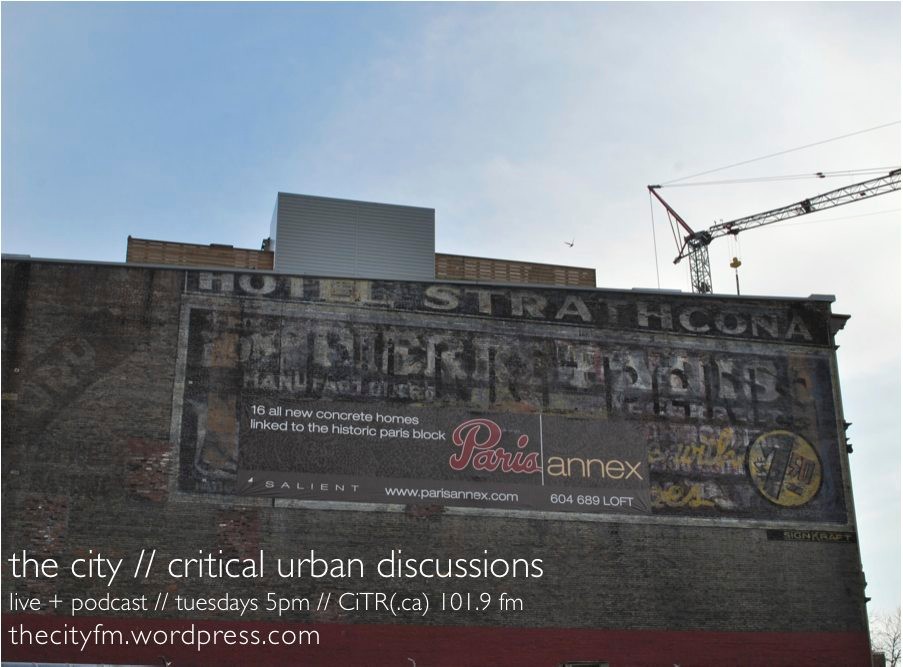
Do you live in Mount Pleasant?
...then you may be interested in the Rezoning Hearing at City Hall for the Kingsway/Broadway Rize site. The hearing is 7:30 pm on Monday, February 27. See this.
"Dear Family, Friends, and Colleagues,
I am very excited to announce that I am launching a weekly, one-hour urban affairs radio show called The City every Tuesday at 5pm. The first show will be broadcast this Tuesday, February 21st from 5-6pm on CiTR 101.9 FM in Vancouver, streaming online, and available shortly after the live show as a podcast. I've listed all the ways you can listen here. The show will have a Vancouver focus, but issues with broad relevance will certainly be addressed. I hope to bring alternative and critical perspectives to the issues and bring a diversity of guests onto the show. There will be music in addition to talk. I have created a website for the show, which I will update frequently: www.thecityfm.wordpress.com.
On Tuesday's show, I will be talking with the Residents Association of Mount Pleasant about the proposed rezoning of E Broadway and Kingsway for a 19-storey comprehensive development including 241 market condos. Obviously there are many implications -- and this rezoning will set a precedent of upzoning lower density neighbourhoods. The public hearing for this proposed rezoning is scheduled for Monday, February 27th.
The inspiration for The City comes from any different people and places. I feel strongly that we need to create spaces for important dialogue – and campus and community radio is a wonderful place for these discussions to occur. I hope you can check out the show, and perhaps even join the discussions live on air. I would love to have your feedback, suggestions for content, and any music you would like to hear.
Please forward this information onto anyone who may be interested. Thanks!
All the best,
Andy
Andrew Longhurst"
The City
This just in, from Andrew Longhurst. Andy took Urban Studies 400 last year, and is now starting a radio show as a forum for critical urban discussions! Details below...
Week Eight. March 5. Catastrophes in and of the Capitalist City.
Hegel's Email Here is the contact list we circulated in class on February 27.
You've earned my respect and awe for your individual contributions to the seminar, and to the collective body of thought you're building. Keep up the good work, and start writing. ABW! (If you don't know what I mean, see this.) On March 5, the first item on our agenda is to hear updates from those colleagues who weren't able to provide progress reports last week. Then we'll consider the contrasts and parallels between Harvey's voice in Social Justice and the City, published in 1973, and the more current urgency of The Enigma of Capital.
Read:
Chapters 1-4 of David Harvey (2011). The Enigma of Capital. New York: Oxford University Press.
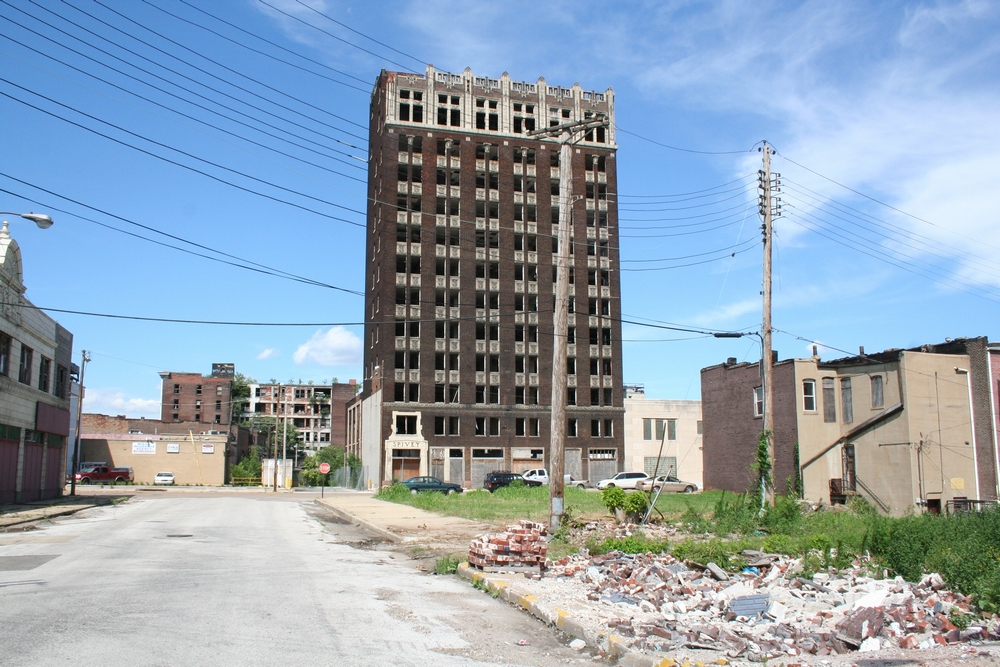

The enigma of capital is a complex affair, but it is highly visible once you know what to look for. The flows of wealth and accumulation in one place are often directly financed by the disinvestment and exploitation of people and institutions in other places. Above, the global circuitry of Wall Street capital: the New York Stock Exchange, New York, February 2012; below, one of many epicenters of disinvestment and extractive accumulation by dispossession, East St. Louis, Illinois, July 2007. This is the PLVI of East St. Louis -- a geek-fest technical term for the Peak Land-Value Intersection, which is usually signified by the intersection where one can find a city's highest building. It tells you something when you go to the PLVI and find ... an empty building. Yet another enigma of capital: when a place is no longer worth productive, constructive investment -- when it becomes a place of extractive exploitation or abandonment -- the institutions of protection and security become highly suspicious of anything and everything. Not long after I took this photograph, the authorities surrounded us. If you're interested in what happened next, see pages 509-510 of "Things Pictures Don't Tell Us."
For another example of a "disposable" city, consider the case of Cairo, Illinois:
[Thanks to Pierson Nettling for the recommendation.]
What is the Future of the Past?
One source of inspiration for one of my lectures on ancient cities is Alexander Stille's delightful book, The Future of the Past. Once a good conceptual argument reshapes your perspective on the messy empiricism of the daily headlines, you begin to see unexpected connections everywhere. Consider Stille's metaphor, and then take a look at this:
David Streitfield (2012). "In Flood Tide of Digital Data, an Ark Full of Books." New York Times, March 3.
Week Nine. March 12. What Is to Be Done and Who the Hell is Going to Do It?
Read:
Chapters 5-8, and afterword of David Harvey (2011). The Enigma of Capital. New York: Oxford University Press.
Peer Review
Remember our discussion of peer review last week? Sometimes you get referees who are cranky and hard to convince. But sometimes you get really nice, constructive, and very helpful recommendations. If you're interested, here's what it looks like.
Here is a draft of "the New Meaning of Housing in America," a piece I've written with Dan Hammel, Sage Ponder, and Pierson Nettling.
Here's a peer review and Editors' comment letter. You can see that the peer reviewer likes the idea, but has a lot of recommendations for major changes. We've got a lot of work to do.
So, what does this mean I need to do...?
Events
Here are a few upcoming events that you might find interesting. [It should go without saying, but just to clarify: these are optional, not required parts of the course syllabus.]
Cities and the Nature of Canada
Dear All: Just a reminder of the next talk in the Canada Transformed series is by Michèle Dagenais - Département d'histoire - Université de Montréal - on MONDAY 12 March 2012 in the GREEN COLLEGE COACH HOUSE at 5:00pm
Her topic is CITIES AND THE NATURE OF CANADA (abstract below)
Please forward as you see fit. ALL ARE WELCOME
--Matthew Evenden and Graeme Wynn
Michèle Dagenais is a historian of cities politics and the environment. Among her recent publications are:
- Montréal et l'eau. Une histoire environnementale, Montréal, Boréal, 2011.
- Metropolitan Natures. Environmental Histories of Montreal, Pittsburgh, University of Pittsburgh Press, 2011 (ouvrage collectif dirigé avec Stéphane Castonguay)
- Faire et fuir la ville. Espaces publics de culture et de loisirs à Montréal aux XIXe et XXe siècles, Sainte-Foy, Presses de l'Université Laval, 2006.
- "The Urbanisation of Nature: Water and Parks Networks in Montreal", dans Alan MacEachern et William Turkel, dir., Methods and Meanings in Canadian Environmental Histroy, Toronto, Thomson Nelson, 2008, p. 266-296.
- «Le naufrage du projet de programme d'histoire ‹nationale›. Retour sur une occasion manquée accompagné de considérations sur l'éducation historique», Revue d'histoire de l'Amérique française, 60, 4 (printemps 2007), p. 517-550. (avec Christian Laville).
Cities and the Nature of Canada
Abstract: Although some 80 percent of Canadians are urban dwellers, Canadians have long held a somewhat ambivalent—even antagonistic—attitude toward cities, and especially large cities. Cities are rarely considered in discussions of “the nature of Canada” and amid the plethora of images of forests and prairies, cities hardly figure in definitions of Canada or the collective imagination of the country. Prevailing views of cities as power containers, and monopolisers of hinterland resource wealth pose a false dichotomy, conceiving of cities and their inhabitants as distinct and separate from the rest of the country.
The talk will place cities at the centre of Canadian nature and illuminate some of the social and environmental processes produced by urbanization in the 19th century. It will address three questions at the heart of debates about contemporary cities from an historical perspective: the ecological imprint of cities on Canadian space; the diversification of urban populations; and the urban metabolism produced by the exchange of goods between cities and their hinterlands. Finally, the talk will ask whether contemporary Canadian cities are on the way to becoming sustainable, bio diverse and healthy places.
Writing at Risk
Many months ago, I agreed to be part of a series called the "Scholar in Residence" series at the UBC Gage residents. I'm still learning how to be a scholar, and my 'residence' there will be only a few hours...but who knows, perhaps you might be interested.
If so, here are the details: 5:15 PM, Izzy Mac Ballroom, Walter Gage Residence, 5959 Student Union Boulevard.
-------- Original Message --------
Subject: Re: Faculty in Residence Speaker Series, March 27, Walter Gage
Date: Sat, 10 Mar 2012 12:24:16 -0800
From: Elvin Wyly <elvin.wyly@geog.ubc.ca>
To: Ferguson, Kate <kate.ferguson@ubc.ca>
CC: Johnson, Deborah <deborah.johnson@ubc.ca>, Webber, Johanna <Johanna.webber@ubc.ca>
Kate,
Many thanks for the reminder.
bio:
Elvin Wyly is Associate Professor of Geography and Chair of the Urban
Studies Program. He is a specialist on cities and urban inequality in
the United States and Canada. His recent publications include articles
on gentrification and displacement in New York, the ongoing foreclosure
disaster in the United States, Vancouver's experience hosting the 2010
Winter Olympic Games, and the contemporary political implications of
interdisciplinary histories of the epistemology of positivism that have
misinterpreted the legacy of Auguste Comte. All the obtuse verbiage in
the previous sentence, and all those academic publications, however, do
not change the fact that he still feels incompetent as a writer. So he
constantly struggles with the writing process, and with changes in what
it means to write in today's university.
photo:
attached high-res photo.
You will notice that this is not a photo of *me.* In situations like
this, I prefer to make the photo not about me, but about something else.
I sent a suggested reading a long, long time ago, so I assume you
circulated that to the students. It's somewhere my archive of
gazillions of emails, but there's no chance of me digging it up, but I
do remember reading it, and mainly what I'd like to do is talk to the
students about my/their experiences with the writing process,
Tell me location of where to show up on mar 27,
best,
elvin
On 07/03/2012 4:10 PM, Ferguson, Kate wrote:
> Hi Elvin,
>
> We’re looking forward to welcoming you to Gage on the 27^th for the
> final talk in the Faculty in Residence Speaker Series.
>
> I’m confirming your title, “Writing at Risk”, and also asking that you
> send along a brief bio and a high resolution photo that we can use in
> our promotional materials. Ideally if we could have that information a
> week today, it will ensure that our advertising for the event can go up
> in plenty of time.
>
> Thanks,
>
> Kate
>
> ________________________________________
>
> Kate Ferguson
>
> Assistant Director, Residence Life
>
> Student Housing and Hospitality Services
>
> University of British Columbia
>
> 2205 Lower Mall, MD #6
>
> Vancouver, BC V6T 1Z4
>
> p: 604 827-5724
>
> f: 604 822-6935
>
> e: kate.ferguson@ubc.ca
>
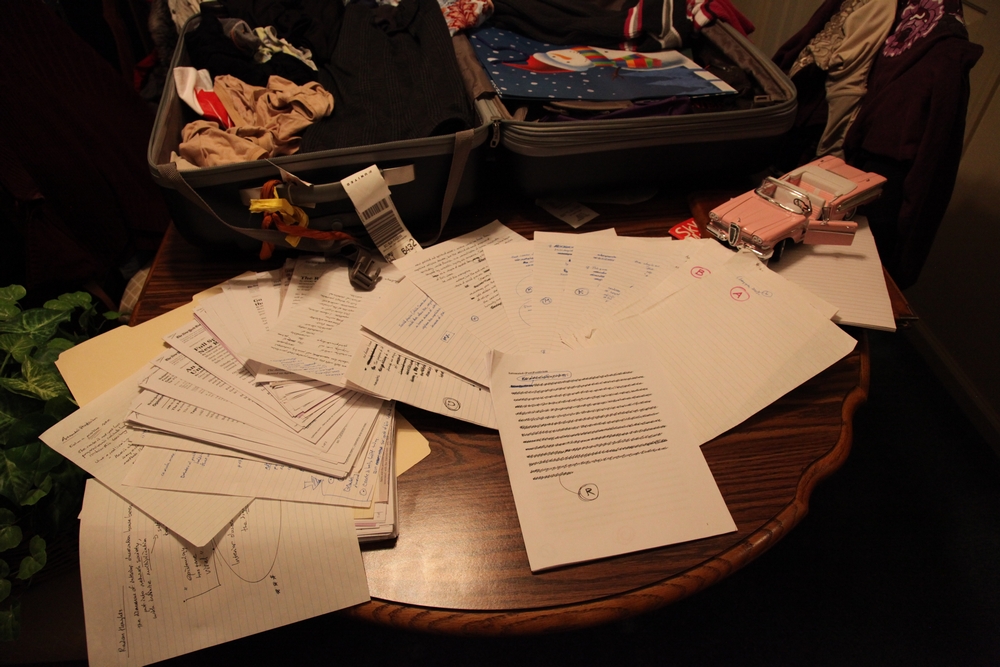
perhaps a useful tidbit?
OccuPrint
Occuprint collects and distributes protest and mobilization posters from the Occupy Movement. Depending on the topic and focus of your written project, you might find this a good source for some raw material for what Peter Gould once called "graphical rhetoric": messages designed to provoke, illuminate, mobilize, or challenge ...
If you want to learn more about Gould's perspective on graphical rhetoric, go to the Geographic Information Centre, Geography Room 112, and look on the course reserve shelf under Geography 450 for this:
Peter Gould (1999). Becoming a Geographer. Syracuse, NY: Syracuse University Press.
See, especially, the "Pro Bono Publico" section beginning on page 185.
Gentrification Storm Warning
Wendy Pedersen has been doing excellent work at the Carnegie Community Action Project, and her use of strategic cartography is brilliant. Wendy is not responsible, of course, for the way Global TV has edited the piece, which culminates in a final segment that should make us all very uncomfortable. The entire process of real estate inflation is blamed on just one factor: "offshore money," all those "foreign buyers." This is one among many factors. Focusing solely on "foreign buyers" is extremely dangerous, and plays right into the hands of those who want to turn the entire city into a speculative acccumulation machine. If you want to learn more about what I mean in that last sentence, watch the Global TV report and then read Katharyne Mitchell's article.
Writing, Unplugged
I hope you're well into the adventures of writing your paper for the seminar. From time to time you'll notice that I post reflections on the writing process, so root around various sections of the website if you're interested, or ask me in person if you need advice or nudge-ing.
Here's another random reflection. Sometimes stuff begins to write itself, if I just listen to the muse. I just returned from a quick trip to Columbus, Ohio, to present a paper that I finished writing a while ago. The audience was faculty and students in the Department of Geography, and the Kirwan Institute for the Study of Race and Ethnicity, at the Ohio State University. Brilliant, passionate scholars and students all. I gave a presentation on some matters of epistemology, and then there was a more open-ended seminar discussion of a paper I wrote on housing. (Keep in mind that these long, verbose beasts of papers have been written over a fairly long period, and they have been changed over time, and will continue to change over time. When you get to my age, the kind of writing you're expected to do often requires as much *rewriting* as original writing.).
But it all starts somewhere. While waiting for the flight to board at YVR, I bought a copy of the Times at Hudson News, and read a story that really made me think about some connections, and some ways to explain what people in my field do. So I started scribbling. Here's what I have so far, on the pages that follow my shameless self-promotion (the poster for my talk at OSU). The notes are all raw and still coming into view, but you have to start somewhere, and then you start revising, and you keep reworking, revising, re-thinking. At some point I will make a more explicit connection, with citations, to Dan Sui, who organized a group of scholars to comment on a famous article written by a guy in the late 1960s -- what came to be called the "First Law of Geography." I thought of this as I was reading the article, and probably I was thinking about Dan Sui because he's the Chair of the Department at OSU.
Then that made me think of campy musical references, specifically "I Fought the Law and the Law Won," a standard cover for most bands. Here's the original Bobby Fuller doing it, and then a few years later there was Johnny Darrell's version. Then, over the course of the next generation, you have everyone from Green Day, and The Clash, and Springsteen, and the Grateful Dead, and the Dead Kennedys doing covers of the old classic.
So after I had scribbled some notes, I went back and added the playful title. The essay is going to be about the First Law of Geography, and how it still shapes a lot of things around us -- although the law has been amended many times and there are quite a few lawbreakers. But for me, I fought the law, and the law won...
The raw notes I have so far are just the introduction -- the entire preamble up to the point where I'll engage with that that article is actually all about. I usually write out notes like this, then once I have a critical mass I type it up, print it out, and then begin to add and reorganize. There's an iterative back and forth between pen-and-paper and clean-computer-processed words and letters. I know it looks a bit strange, but it works for me.
And when it comes to writing, the key is finding out what works for you.
Here are a few lessons you may wish to draw from this little story. First, Elvin is kinda weird. Yep. Second, while computers and keyboards and smartphones are great -- and while the new iPad 3 will have a dictation function that will allow you to speak and have the thingie transcribe it into digital text for you -- there is still a place for the hand-written word. If (when) our devices die or malfunction or are rendered obsolete by a quick technological change, it's nice to still have the centuries-old technology of slow, hand-written letters on pieces of paper. Third, while we usually read in a linear start-to-finish fashion, things are not always written in a linear way (i.e., I wrote the title after having written a few pages).
Fourth, ABW.
Week Ten. March 19. Philosophies of Urban Justice.
Read:
Chapter 1 (pp. 23-56) of Susan Fainstein (2010). The Just City. Ithaca, NY: Cornell University Press.
*
[Optional stuff]
Grab a cup of coffee, watch this, and tell me what you think...
Paper Deadline. Final seminar papers are due no later than 5:00 PM on Wednesday, April 25. Submit your paper in person, in the Geography Department office, under my office door (Geography 252), by carrier pigeon, courier, telepathy...
...and if you use email, please prepare a single document in *.doc (not *.docx), *.rtf, or *.pdf format.
Deadline
As I mentioned in class, I'm giving you as much time as I possibly can to submit your final work for the course: 5:00 PM on Wednesday, April 25. There is a small chance this deadline may be moved earlier if I receive yet another of those UBC emails that changes the rules in the middle of the term (the rules we professors are governed by are always changing as well). I will let you know if anything changes.
If you need help or advice on your project or anything related to the content of the course, then don't be shy about calling me: my cell is 778 899 7906. I do sincerely understand that UBC can sometimes be A Place of [a busy, stressed-out] Mind.
There's now a new system created to try to deal with the problems of UBC's global ambitions. These global ambitions often make the lives of students ever more stressful.
See
If you're interested in what I think of this new system, see below. Note that their "Security Policy" means that I am not authorized to tell the powers that be that you should be allowed to self-refer if you need help.
Sigh...
-------- Original Message --------
Subject: Early Alert
Date: Wed, 14 Mar 2012 15:22:25 -0700
From: Elvin Wyly <elvin.wyly@geog.ubc.ca>
To: Catherine Aldana <catherine.aldana@geog.ubc.ca>, 'David Ley' <dley@geog.ubc.ca>
Catherine,
David,
I'm sending this to you because apparently "Security Policies" do not
allow me to comment to the powers that be who have launched the Early
Alert system.
Good intentions, horribly bad privatized dot com implementation.
best,
Elvin
-------- Original Message --------
Subject: Undeliverable: Early Alert
Date: Wed, 14 Mar 2012 15:18:35 -0700
From: <postmaster@exchange.ubc.ca>
To: <elvin.wyly@geog.ubc.ca>
*Delivery has failed to these recipients or distribution lists:*
earlyalert@exchange.ubc.ca <mailto:earlyalert@exchange.ubc.ca>
Your message wasn't delivered because of security policies. Microsoft
Exchange will not try to redeliver this message for you. Please provide
the following diagnostic text to your system administrator.
------------------------------------------------------------------------
Sent by Microsoft Exchange Server 2007
*Diagnostic information for administrators:*
Generating server: mercury.ad.ubc.ca
earlyalert@exchange.ubc.ca
#550 5.7.1 RESOLVER.RST.AuthRequired; authentication required
##rfc822;earlyalert@exchange.ubc.ca
-------- Original Message --------
Subject: Early Alert
Date: Wed, 14 Mar 2012 15:18:09 -0700
From: Elvin Wyly <elvin.wyly@geog.ubc.ca>
To: earlyalert@exchange.ubc.ca
Dr. Washburn,
I've visited the Early Alert website, dug deep enough into the system to
see a bit of how the symplicity.com interface works, and have a few
comments.
1. It's lamentable that this is yet another venue for subcontracting,
automation, and privatization. The winner this time seems to be a
company based in the northern Virginia suburbs (the 703 area code).
This also seems to be a clear violation of UBC's regulations regarding
the confidentiality of student records, since everything submitted on
the system will be open pursuant to the U.S. Patriot Act.
2. There is a very serious flaw in the entire program, and I strongly
urge you to fix it. Students are not allowed to self-refer.
This will prevent the most serious problems from getting any attention
whatsoever from Early Alert.
Why? Look for the black swan.
When students have serious problems, they disappear. Since Early Alert
can only be initiated by an instructor logging on to yet another UBC
website to fill out yet another form, this means that we are relying on
the attentiveness of instructors to identify the counter-factual -- to
keep a close eye on students who have disappeared.
Yes, some instructors do this. This is feasible for small classes --
and classes that have lots of hoops for the students to jump over.
But there are a lot of classes at UBC that are just too large -- or that
actually give the students a bit of freedom to work through the semester
without constant surveillance and checking in by the instructor.
Early Alert will do nothing for students in these classes, because it
relies on instructors who are overwhelmed by the rising tides of the
global digital flood. This term I'm teaching two classes, with a
combined enrollment of about fifty-five. Some of the students missed
class this week, and a few students have missed more than one class. Do
I have the time to try to figure out if they are going through something
serious? Do I have the right to try to do internet sleuthing or asking
around about them, to see if they are okay? I think UBC's regulations
actually prohibit me from trying that even if I had the time. And I
don't. I am forced to be reactive, and there is no time to be
pro-active, as much as I would like to do so. In the minutes I'm
spending typing this email to you, emails are flooding into my in-box,
ding, ding, ding. I can't keep up. Can you?
So this means that I react to what I see and experience -- what happens
in the classroom, and what happens when students reach out to me.
But if students do *not* reach out to me, then I have no way of knowing
what they are going through.
[mode::rant::off]
I'm sorry for the rant. Simple solution: Allow students to self-refer
on UBC's Early Alert system.
And bring it back to UBC, run by UBC faculty and staff for UBC students.
There's plenty of defense contracting and NSA surveillance employment
available for firms in the 703 area code.
best,
Elvin Wyly
-------- Original Message --------
Subject: [faculty] Fwd: Launch of Early Alert Program
Date: Wed, 14 Mar 2012 14:01:52 -0700 (PDT)
From: Catherine Aldana <catherine.aldana@geog.ubc.ca>
To: faculty <faculty@geog.ubc.ca>, staff <staff@geog.ubc.ca>
----- Forwarded Message -----
From: "Heads Up Email" <headsup@interchange.ubc.ca>
To: undisclosed-recipients: ;
Sent: Wednesday, March 14, 2012 12:59:46 PM GMT -08:00 US/Canada Pacific
Subject: Launch of Early Alert Program
This is sent on behalf of Janet Teasdale, Senior Director, Student
Development and Services.
__________________________________________________________________________
Student wellbeing is fundamental to the aspirations of UBC’s campus
community and pivotal to student learning and success. We recognize
that throughout a student’s time at UBC, there are multiple ways in
which their success may be impeded. This includes challenges associated
with their transition to UBC, financial resources, academic and career
aspirations, as well as mental and physical health.
In support of UBC’s goal to create a campus community that is deeply
conducive to student wellbeing, we are pleased to announce the launch of
Early Alert. With Early Alert, faculty and staff can identify their
concerns about students who are facing difficulties sooner and in a
more coordinated way. This gives students the earliest possible
connection to the right resources and support, before difficulties put
their academic success at risk.
More information for faculty, staff, and students is available on the
Early Alert website: www.earlyalert.ubc.ca
Questions about the Early Alert program can be directed to:
Cheryl Washburn, Ph.D., R.Psych
Project Lead, Early Alert;
Director, UBC Counselling Services;
G
Gothenburg Gentrification
In late 2009, I had the good fortune to spend some time in Lund, Sweden, where Eric Clark organized a conference on "the Right to Stay Put." Catherina Thorn presented some brilliant and eloquent research on the transformation of the city of Gothenburg. Here's an update on the work she's been doing to document changes in the city.
See:
Catharina Thörn (2011). "Soft Policies of Exclusion: Entrepreneurial Strategies of Ambience and Control of Public Space in Gothenburg, Sweden." Urban Geography 32(7), 989-1008.
-------- Original Message --------
Subject: gentrification ehibition in Gothenburg - newsletter
Date: Wed, 14 Mar 2012 11:09:32 +0000
From: Catharina Thörn <catharina.thorn@kultvet.gu.se>
To: Smith, Neil <NSmith@gc.cuny.edu>, Tom Slater <tom.slater@ed.ac.uk>,
Kirsteen Paton <k.paton@lbss.gla.ac.uk>, Matthias Bernt
<matthias.bernt@ufz.de>, Anders Lund Hansen
<Anders.Lund_Hansen@keg.lu.se>, Henrik Gutzon Larsen <hgl@plan.aau.dk>,
Margit Mayer <mayer@zedat.fu-berlin.de>, Lees, Loretta
<loretta.lees@kcl.ac.uk>, Elvin Wyly <elvin.wyly@geog.ubc.ca>, Eric
Clark <eric.clark@keg.lu.se>
Dear all
This is a short report on how the exhibition on gentrification is progressing and this will be the first newsletter this year. Many of you have been here and also taken part in our round table discussion.
There has been some turbulence due to changes in leadership at the museum as well as reorganization at the university that made the road a bit shaky for a while. But now we are back on track and the new leadership at the City Museum has decided to do the exhibition although it will be delayed 6 months and open February 2013.
1.Two big conferences have been completed on gentrification (and a number of smaller seminars) and thanks to all of you who participated. There conferences still a basis for a very productive discussion here. I hope to do two more before the opening of the exhibition. One on the Right to the City movement and gentrification resistance and one on gentrification in Scandinavia.
2.A masterclass with students study gentrification is now ongoing and the students has now completed their practice at the City Museum and they created a mini-exhibition on gentrification. During three months they did interviews with lots of people from artists, civil servants, city planners to tenants which they used in the mini exhibition. They also spent one month in Gamlestan a quite central area that is about to be gentrified and did city walks and talked about gentrification in the area and spoke with approximately 1000 people on the changes in the area. And for the opening of the mini-exhibition about a 100 people came and it is still in place for people to see. They are now writing their essays.
3.A text book on gentrification is planned to be published in relation to the exhibition. It will be published by one major university publisher here in Sweden and hopefully be part of education here in Sweden. I and Helena are the editors and we have chosen texts from you in the reference group that are in the process of being translated. We will also write an introduction to introduce your texts and more general research on gentrification are presented.
4.In our preliminary discussions on the exhibition we have talked about presenting a few international cases such as Islington, Prenzlauer Berg and Lower East side and then a few local examples from Gothenburg and one Scandinavian (Vesterbro). Then to have some themes were displacement is a central one. Another central part will be on resistance against gentrification. All of your research is very important to us so our discussions on your work are very important for what themes we will put forward.
5.We have also arranged a city tour called The class remake of Gothenburg where we do a four hour tour in Gothenburg to talk about gentrification and the class remake of Gothenburg the last 30 years. We
are three researchers talking about the changes in the city and how to understand the divisions of the urban landscape in Gothenburg. We did
one last year and two this spring and hope to continue as part of the preparation for the exhibition. These bus tours are open for the public.
6.For all of you who have been here I will also let you know that Katarina (the photographer) and I have signed a contract to do a photo book on the changes in Kvillebäcken. This is a big thing for us since Kvillebäcken now has turned into the display window in Gothenburg for sustainable urban development and as you can understand it is vital to challenged that.
Ok this is all for now – during this year you will get more update information. I hope you who went to the AAG in New York had a great time - it seemed to be a very good conference.
Best wishes from Gothenburg Catharina
2
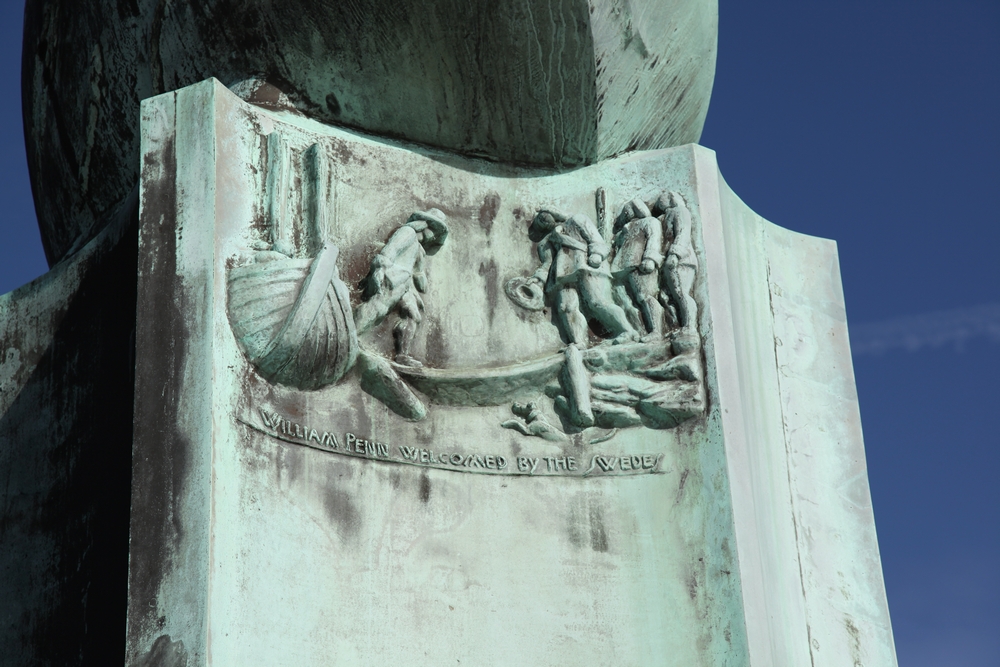
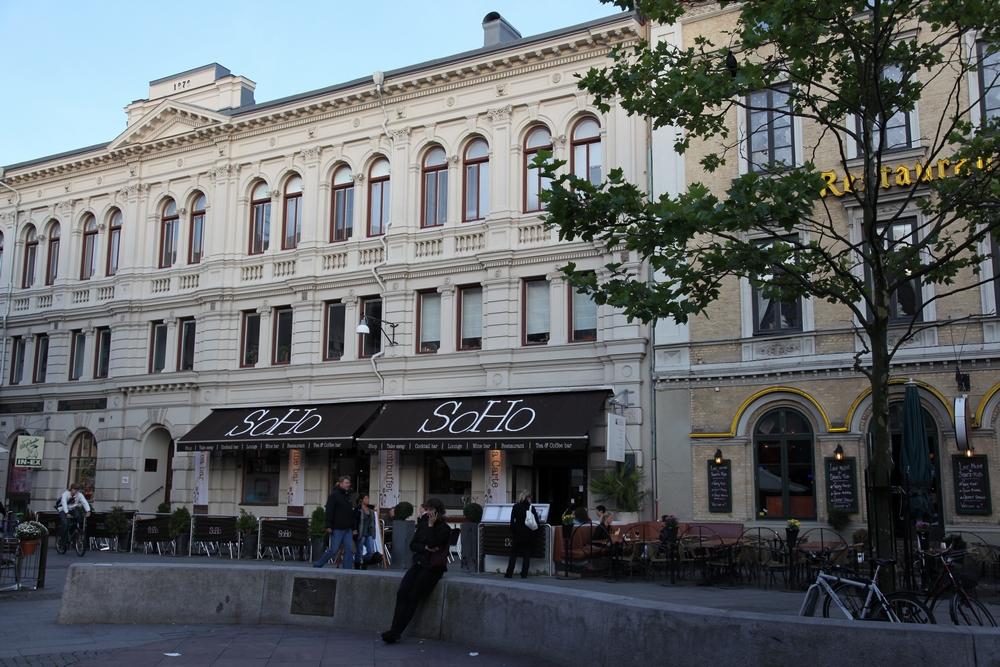
A few images of Gothenburg, September 2009 (Elvin Wyly)
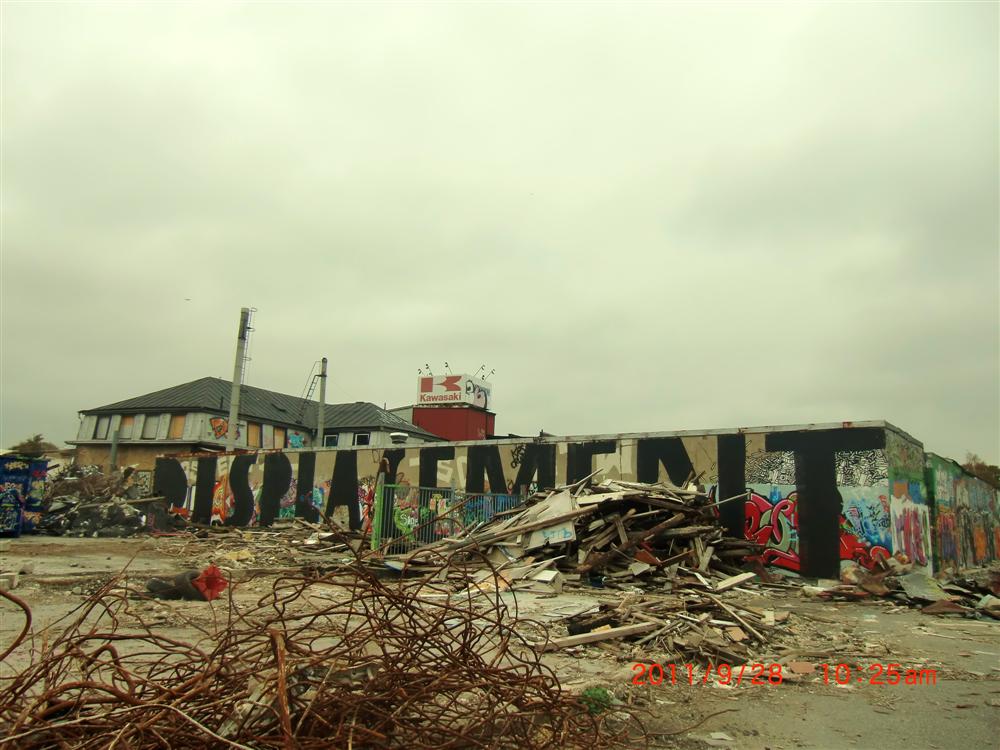
...and an even more vivid image of the local struggles over space and city, public and private, people and profit, community and capital. Photograph of Gothenburg, Sweden, September 2011, by Catharina Thörn, posted here by permission.
See also
Week Eleven. March 26. Looking for the Just City in ... New York / London / Amsterdam.
Read any one of these chapters:
Chapters 3, 4, or 5 of Susan Fainstein (2010). The Just City. Ithaca, NY: Cornell University Press.
Humanities 101 + Urban Studies 400
Remember our discussion of common interests with the Humanities 101 students? Here are the details: Tuesday, March 27, 5-6 pm. Meet at the Humanities 101 Program Office, Buchanan E270.
Note that I won't be able to join you because of my commitment to the "Writing at Risk" workshop at the Gage Residences. So please send my best to the Hum colleagues, and to Professor Margot Leigh Butler, for all their wonderful work!
You might also be interested in reading about this latest development in the Downtown Eastside before you meet with the Humanities 101 colleagues. (I would go to City Hall, but I'm already booked with meetings with several students...)
***
SOS! The city is slipping condos through the back door while we guard the front!
Join CCAP, DNC and many others from the DTES low-income community to speak out against a policy that could destroy the low-income community in the name of helping it
TUESDAY MARCH 27, 2PM, VANCOUVER CITY HALL
(meet 1pm at Carnegie 2nd floor)
To sign up contact Bonnie Kennett, Meeting Coordinator, at 604.873.7269 or e-mail: bonnie.kennett@vancouver.ca
The City’s Interim Rezoning Policy and Development Management Guidelines for the DTES Local Area Planning Process (LAPP) are supposed to provide some relief to the low-income community from the pressures of market development so that we can do long-term planning. We feared that these policies would be weaker than we needed but we never dreamed that they would sneak a gentrification bomb in the back door of this policy, burying it in a last-minute document that the committee never got a chance to see or comment on before it was sent to council…
The city policy that will streamline 79 units of condos in exchange for only 8 units of social housing at welfare rate on the 138 E Hastings Sequel 138/Pantages condo site, says:
“In the areas governed by the existing Downtown Eastside Oppenheimer Official Development Plan (DEOD ODP), any development permit application for residential development over 1 FSR must include 20% social housing. For the purposes of these Development Management Guidelines and interpretation of the DEOD ODP, “social housing” means residential units that are owned and/or operated by government or a Council-approved non-profit, with at least 50% of these units where the tenant contribution to rent is no more than the shelter component of income assistance for a single individual ($375) and the remaining 50% of units with a maximum monthly rent of 30% of BC Housing’s Housing Income Limits (HILs) or CMHC market rent (whichever is lower).” [This means that the 50% not renting at welfare rate could rent for up to $837.50 to $925 depending on whether they are bachelor or one-bedroom units.]
Stopping this policy change from going is urgent because the DTES Oppenheimer District (DEOD) is the only sub-area of the DTES with special zoning that requires 20% social housing in every project. This policy will cut this 20% requirement in half by defining only half of this social housing at welfare rate. The 20% requirement (which has not yet been defined in terms of rent-costs) has managed to significantly limit condo development in this area. If it is weakened to slide 79 condos onto the 100-block it will also send a signal to developers with speculation properties they have been sitting on in the area: The DEOD is open for business!
City policy expects that, because of depressed land values and development controls, the DEOD must be the main area where SRO hotels are replaced with social housing. The Housing Plan warns that if the DEOD becomes "attractive" to market developers then the city must act to lessen this attraction or the social housing targets will not ever be reached. Now is the time to act to slow development, not encourage it.
CCAP knows of five blocks where significant property combination has already taken place, likely by speculators waiting for the market to be right and the restrictive zoning to change.[1] The first and most urgent of these property combinations / condo-developments in waiting is “Sequel 138,” the condo project at the former Pantages Theatre site on the 100-block of East Hastings. The proposal negotiated with city staff by the developer at Pantages is the model for the policy change around the definition of social housing in the DEOD… though maybe it’s a bit chicken-or-the-egg.
The Sequel 138 deal is for 79 condo units at about a-quarter-million-dollars apiece and only 8 or 9 units of social housing at welfare/old-age-pension rate. If approved, Sequel 138 will be the thin edge of the wedge that will open up the DEOD to further gentrification. We can be sure more proposals for market housing will flood in as a result of City approval of this definition of social housing and Sequel. The city must STOP this proposal and we need your support to push them to stop the Pantages sneak!
For more on Sequel 138 condos at the Pantages site:
And more on the proposed DTES LAPP Interim Development Policies:
On the “Rate of Change” (gentrification) in the DTES
For more info:
CARNEGIE COMMUNITY ACTION PROJECT
ccapvancouver.wordpress.com | Wendy: 604-873-0379
[1] The four other packages we know of, besides 138–144 E. Hastings include: 121 Main St; 319 Main St; 337, 341, 357 E. Hastings around Flowers restaurant; and the 500-block of Cordova.
Week Twelve. April 3. Presentations.
Thank you for your valuable contributions to the seminar.
This seminar is what you make it, and so I thank you. And I hope you will join me in thanking *previous* generations of students. Manu took this course a few years ago, and is currently doing a lot of interesting work:
We are starting to map tweets and blogs on Rio+20 at global scale. Next is SMS traffic. 200,000 tweets a minute. 129,000 SMS per second.
www.ourrio20.com. [Beta]
- M
On Mon, Apr 2, 2012 at 10:39 PM, Manu Kabahizi <izmanu@gmail.com> wrote:
Dear Friends,
In less than 100 days global leaders will travel to Rio to decide on the global course for sustainable development. I don't know what the leaders will decide and they haven't asked me. I also know that 20 years ago global leaders made commitments many of which have become unfulfilled promises and others were simply lousy promises. But this time it is different.
With the inspiration from my friend, Nick, I've created a resource to help the public get up to speed on the issues for Rio+20 and have an opportunity to share their opinions. We'll use social media and mainstream media to let everyone know that every idea, opinion or thought counts. We'll use social media to get people talking along with email campaigns and SMS tools.
The objective is simple: "let leaders of the world know that the public is aware, opinionated and watching." The numbers count.
I created this resource over the weekend and I need your help. With 79 day to the Rio+20 conference, Time is of essence and thus far I'm trying this out on my own. I need help in all areas: more opinions, analysis, fundraising (very little needed), spreading the word, design, ideas, critiques, etc... The mission so far is to get the people contributing views as much as possible and to have the world leaders know that these views exist. Hence the challenge, since this is already built, is to create public awareness.
The resource I am using allows for people to provide opinions and those opinions are mapped. There is also an option to comment on others' opinions either through a Facebook integration or directly on the website. I think the mapped conversations can be powerful.
What do you think: www.ourrio20.com?
Can you help?
Peace,
M
The Barn
May, 2012. I just finished reading every word of every line of every page of every student's paper. I'm impressed with your individual achievements, but also with your collective work. You built a great barn. Indeed, one of the kindest notes I've received in years included this astute observation: "I really appreciate the opportunity you provide to the students to learn from each other with your guidance. Every class I was blown away by how smart and insightful my peers are."
Read that again. It's not about me. It's not about the individual student. It's about the student's recognition of the insight of other students. Now think back again to our early discussions of Michael Kahn's "seminar" letter. Remember that opening paragraph (Kahn, 1971, p. 1):
"Why do you come to college? It has never seemed reasonable to me that one comes to college because of the professors. If the professors have anything important to say, it can be mimeographed and mailed to you back home in Redding. Nor can I believe you come here for the books. They too can be mailed to Redding. It seems to me the only reason worth coming here for is each other. I believe that you are each other's most important resource along the path of this educational journey."
We all read these words several months ago. But now I think you might be able to reflect on the meaning of Kahn's invitation from a different perspective. Yes, some of the language is dated. Where is Redding? What's a mimeograph? Why mail stuff when we've got [insert your favorite technology/e-reader/content provider]. Harvard and MIT are launching a joint venture for online courses ... available to anyone, anywhere ... for free. Even the activity I just finished last weekend -- reading your papers, is being automated. One of the papers presented not long ago at the National Council on Measurement in Education at a Vancouver conference reported on a study of "automated computer essay-scoring software." The study found "that a handful of programs are 'capable of producing scores similar to human scores' on thousands of sample essays." The software was tested by using it to analyze "17,500 essays that had already been graded by humans." (Toppo, 2012, p. 4A).
There is now, apparently, a serious debate on the merits of "machine scored" essays versus "direct assessment by human readers." (Toppo, 2012, p. 4A). Why is this even a debate? Reading and writing are being automated. So they can be multiplied, so that machines can handle the thousands or millions without the need to pay human beings to do the work. And once things are automated and scaled to achieve economies of scale, then everything can be dropped into those automated systems of surveillance and suspicion -- Turnitin.com and all the rest.
This is evil, and undermines every bit of trust that should be at the heart of the learning process. I did not force you to use Turnitin.com because ... I trust you. I gave you freedom and respect, and in turn you worked hard and did excellent work. We all used machines at various points to help us do our jobs ... but we were careful to avoid automating or commodifying the essence of our teaching, learning, and barn-raising.
Look again at Kahn's quote above. Look past the details of the technology, that mimeographed stuff sent by mail, and focus on what he is really telling us. Would you agree that coming to Room 201 of the Geography Building each week to talk about urban studies was worth it for each other?
I hope you do see things that way. If not, I look forward to learning from you when I read the official student evaluations. But don't be shy about sending me feedback and recommendations in other ways. Call or stop by for a chat, or send me a note. I do read every email received, and I respond when there is a request for a response ... although I cannot always keep up with the flow and cannot promise timely responses to every request.
References
Toppo, Greg (2012). "Computer Scoring of Essays Shows Promise." USA Today, April 24, p. 4A.
The Barn, May 2012
"Every class I was blown away by how smart and insightful my peers are."
BarnRaisers, April 2012, Vancouver

A Constructive Critique of the Barn
Johns, Samuel (2012). "Do You Feel Sufficiently Socrateased? Barn Raising and the Perils of Building on Sand." Progress in URST400: A Journal 1(1), p.1. Vancouver, BC: Urban Studies Program, University of British Columbia.
















